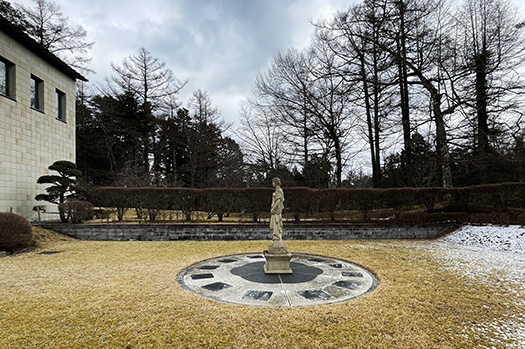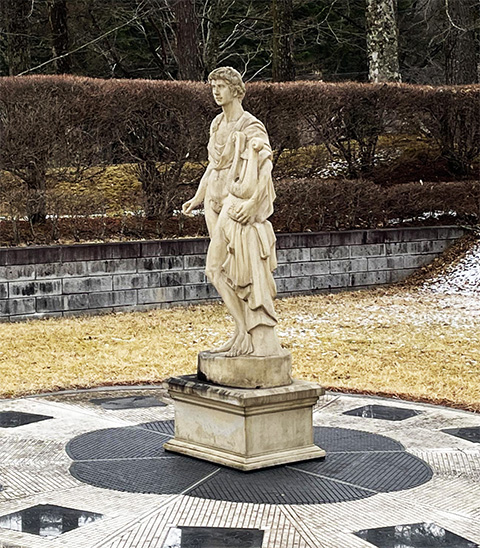

昨日夕刻札幌に帰還しました。関東でも感じていたのだけれど、とにかく寒かった(笑)。
山中湖というのはこの三島由紀夫文学館訪問のためにはじめて訪れた。上の写真でも庭の彫像の右手側にはうっすらと雪がかぶっていた。こういう端境期になるべく軽装で動きやすい服装で行動したいわたしのような人間には、天候への対応というのがいちばん難しい。だいたいがトランクなどは持たずリュックひとつで歩き回り、レンタカーを操って神出鬼没したいタイプには、寒暖差20度以上という気候条件は面倒で厳しすぎる。
しかたなく下着の上に本来は高温時対応の半袖Tシャツを、寒さ対策の「重ね着」としてしのいでいた。まぁクルマ移動なので寒さに肌身で遭遇するのは短時間だったことが不幸中の幸い。
さて三島由紀夫文学館に来て、やはりその場の空間性がさまざまなことに気付けることを再認識させられた。
庭に置かれた彫像と向き合い続けていた三島由紀夫という作家の内面性探究の、切り口を感じたときのう書いた。現実にそのようなシチュエーションを体感してみると、そうか、こういう視認行為を毎日この人は繰り返していたのだという実感が、即座に「体がわかって」くるものなのだ。
で、そういった体験を踏まえてたぶん現地でしか入手できない「文学館図録」を購入していたのだけれど、そのページを宿で開いて見始めて、さっそく驚きの発見があった。
ドナルド・キーンという名前は知っていたけれど、かれが寄稿した短文に接して静かな驚きを感じた。
〜ドナルド・キーンは、アメリカ合衆国出身の日本文学・日本学者、文芸評論家。コロンビア大学名誉教授。 日本文化研究の第一人者であり、日本文学の世界的権威とされる。〜
そこにはこのような作家の記念館という「建築文化」はきわめて日本的な光景なのだという記述。え、あれ、という驚き。こういう視点はまったくはじめて気付かされた。たしかに海外にも作家の家が観光資源になっている事例はあるけれど、その作家の書いたすべてを蒐集して保存し、さらに研究を加えてそれに多くの人が強く惹かれている、というのは日本の独自文化だというのです。わたしはこういう視点・意見を初めて知らされて深く驚かされた次第。そしてそこからさまざまな想念が沸き上がっていく、その大きな起点を与えられた気がしていた。
「作家と住空間」という電子出版作品を創作した人間としては、思わぬ視点をいただいた。これは深掘りするに値する視点。
English version⬇
‘Is the culture of writers’ memorials unique to Japan?’
From Donald Keene, a scholar of Japanese literature, comes a theory that the architectural culture of writers’ memorials is uniquely Japanese. As someone who explores ‘writers and living spaces’, I was deeply moved. …
I returned to Sapporo yesterday evening. I felt the same in the Kanto region, but it was cold anyway (laughs).
I visited Lake Yamanakako for the first time for this visit to the Yukio Mishima Literature Museum. In the photo above, there was a light dusting of snow on the right hand side of the statues in the garden. For someone like me, who likes to wear light and comfortable clothes during these off-season periods, the most difficult thing is to cope with the weather. For the type of person who usually walks around with a rucksack and not a boot, and who likes to go off the beaten track in a rented car, a temperature difference of more than 20 degrees Celsius is too much of a hassle and too severe.
I had no choice but to wear a short-sleeved T-shirt over my underwear, which was originally designed for high temperatures, as a ‘layer’ to protect against the cold. It was fortunate that we only had to encounter the cold for a short time as we were travelling by car.
Coming to the Yukio Mishima Literature Museum, I was reminded that the spatiality of a place can make you aware of various things.
I wrote yesterday that I sensed the opening of the writer Yukio Mishima’s exploration of his inner nature, as he kept confronting a statue placed in his garden. When you actually experience such a situation, you immediately ‘understand your body’ and realise that he was repeating this kind of act of recognition every day.
Based on this experience, I had purchased a copy of the Museum of Literature catalogue, which is probably only available locally, and when I opened the catalogue at the inn and started looking at the pages, I was immediately surprised by what I discovered.
I knew the name Donald Keene, but I was quietly surprised when I came across a short article he had contributed.
〜Donald Keene is an American-born scholar of Japanese literature and Japanese studies, and a literary critic. He is Professor Emeritus at Columbia University. He is a leading scholar of Japanese culture and is regarded as one of the world’s leading authorities on Japanese literature. ~.
The description there is that the ‘architectural culture’ of these writers’ memorials is a very Japanese spectacle. What a surprise! This was the first time I had noticed this point of view. It is true that there are examples overseas where writers’ houses have become tourism resources, but the fact that everything the writer wrote is collected, preserved and studied, and that many people are strongly attracted to it, is a uniquely Japanese culture. I was deeply surprised to learn of this viewpoint and opinion for the first time. I felt that I had been given a great starting point from which various thoughts and ideas would arise.
As the creator of the e-publication ‘The Writer and the Living Space’, I was given an unexpected perspective. This is a perspective that deserves to be explored in depth.
Posted on 4月 1st, 2025 by 三木 奎吾
Filed under: 住宅マーケティング







コメントを投稿
「※誹謗中傷や、悪意のある書き込み、営利目的などのコメントを防ぐために、投稿された全てのコメントは一時的に保留されますのでご了承ください。」
You must be logged in to post a comment.